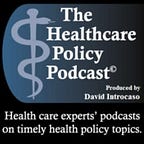In June 2021 I argued in STAT News that HHS require healthcare providers to publicly disclose their GHG emissions that in turn would help enable the healthcare industry to decarbonize. In order to do this, I argued the the Environmental Protection Agency's (EPA’s) Energy Star Portfolio Manager tool be exploited. Already well over 50% of hospitals use Energy Star to better manger their energy consumption, i.e., improve their energy efficiency. Energy Star, an online energy benchmarking tool widely used to track commercial building energy consumption - that accounts for 20% of US GHG emissions - was jointly created by the Department of Energy (DOE) and the EPA in 1992 under authority of the Clean Air Act. Energy Star has become the standard against which approximately 40 cities and other governing jurisdictions throughout the US, and authorities overseas including the European Union, measure mandated GHG emission reductions. Energy use is particularly a concern to the US healthcare industry. Among other things, while representing less than 5% of the total area in the commercial sector, healthcare facilities account for over 10% of total energy consumption. This is largely due to the fact US hospitals are on average more than two times more energy intensive as European hospitals.
During this 37-minute interview Mr. Reed begins by explaining why Energy Star was created. He proceeds to explain that any building can be benchmarked, how Energy Star Portfolio Manager scores buildings, the meaning thereof and the meaning of an Energy Star "certified" score. He notes scoring can automatically calculate GHG emissions. Mr. Reed next provides an overview of what data elements are required for scoring, discusses the use and benefit by healthcare industry by profiling Memorial Hermann Health System's success, provides Energy Star performance data, for example, savings from avoided energy costs, avoided greenhouse gas emissions and public health benefits, potential use by community health clinics and potential effects of related Inflation Reduction Act provisions.
Mr. Clark Reed has been a national program manager for ENERGY STAR® at the US Environmental Protection Agency (EPA) since 1997. His work supports hospitals and other healthcare providers, Fortune 500 companies, and numerous other companies in use of ENERGY STAR to create energy management programs that substantially improve energy performance and reduce greenhouse gas emissions. He has managed the EPA's efforts to establish an ENERGY STAR score for acute care hospitals, medical offices, and senior care communities. Mr. Reed has also served on the American Hospital Association's American Society for Healthcare Engineering's (ASHE's) Operational Excellence task force and the steering committees of the U.S. Green Buildings Council and the Green Guide for Health Care. Mr. Reed writes regularly on energy issues for numerous trade publications. He hold an an MA in environmental policy from Tufts University and a BA in economics from the University of Washington. He lives in a certified net zero energy home in Maryland with his wife and son.
For more information on Energy Star go to:




